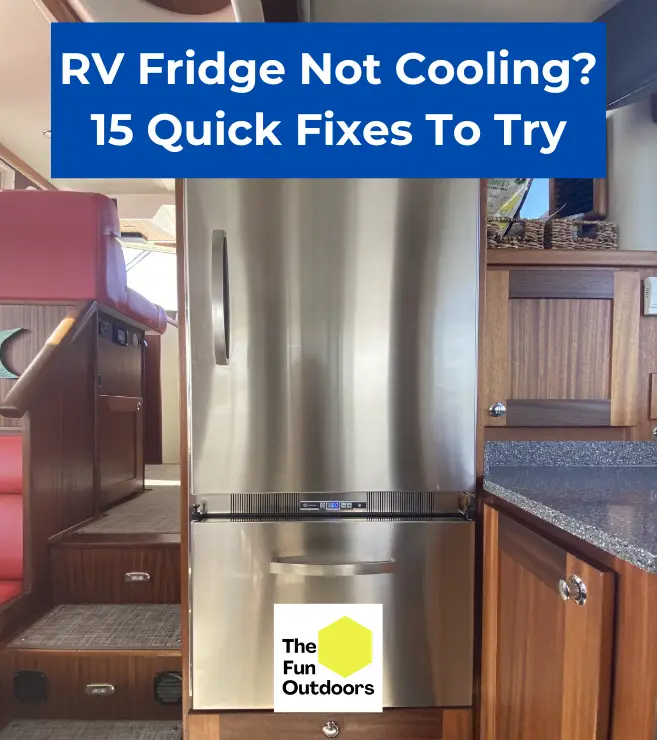RV refrigerators are an essential part of any camping or road trip experience. They keep food and drinks cold while on the go, bringing a key comfort of home with us on the road. Few things are more inconvenient than an RV refrigerator not cooling!
We go over the fundamentals of RV fridges in this guide, along with the most common causes of why an RV fridge isn’t working and, most importantly, how to fix them.
Understanding RV Refrigerator Basics
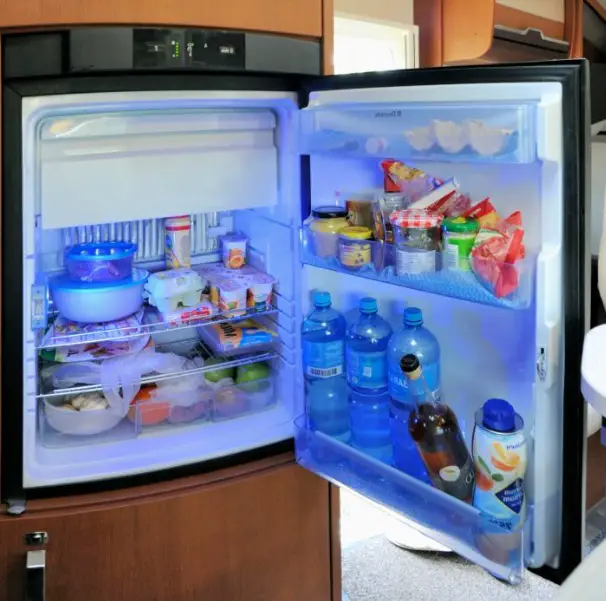
RV refrigerators are an essential component of any recreational vehicle, providing the means to keep food and drinks cold while on the road. These refrigerators operate differently than those found in traditional homes, using either a gravity-fed or absorption cooling unit. Understanding how these components work is crucial to diagnosing and fixing any issues that may arise.
Gravity-fed refrigerators rely on the force of gravity to circulate the refrigerant. This type of refrigerator is not as common as the absorption fridge, but it is still found in some older RVs. In contrast, absorption refrigerators use a combination of heat, ammonia, and hydrogen to create a cooling effect. These fridges are more common in modern RVs and are known for their efficiency and reliability.
RV refrigerators are powered by either propane or electricity, with most models capable of running on both. The cooling unit is made up of several components, including the evaporator, condenser, and compressor. These parts work together to remove heat from the interior of the fridge and expel it outside.
One of the most important things to keep in mind when using an RV fridge is that it needs to be level. This is because the cooling unit relies on gravity to circulate the refrigerant, and any tilt can disrupt this process. It is also important to keep the fridge well-ventilated, as this helps to dissipate heat and keep the cooling unit working properly.
See our guide on how does an RV refrigerator work to learn more.
Check out this flow chart to see how to diagnose and fix your RV fridge issue:
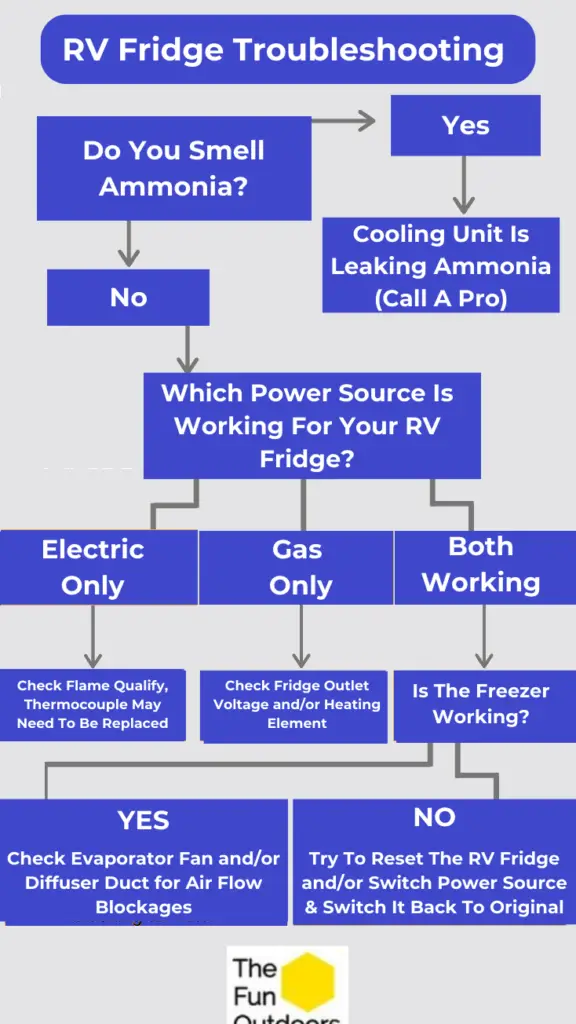
How To Reset An RV Refrigerator
If an RV refrigerator is not cooling properly, one of the first things to try is resetting it. This can be done in a few different ways depending on the make and model of the fridge.
Reset Button
Some RV refrigerators have a reset button located on the control panel or back of the fridge. This button can be pressed to reset the fridge to its default settings. If the reset button is not visible, consult the fridge’s manual or contact the manufacturer for assistance.
Control Panel
If the RV refrigerator has a control panel, it may be possible to reset it through the panel. This can usually be done by pressing a combination of buttons or holding down a specific button for a certain amount of time. Again, consult the manual or contact the manufacturer for specific instructions.
Back of Fridge
In some cases, the reset button may be located on the back of the RV refrigerator. This will require accessing the back of the fridge, which may require removing a panel or cover. Once the reset button is located, press it to reset the fridge.
RV Fridge Not Working On Electric
When an RV fridge is not working on electric power, it can be frustrating and concerning. Here are some possible reasons and solutions that may help:
- Insufficient voltage: The RV refrigerator requires a certain level of heat to stimulate the flow of ammonia in the cooling unit. This process requires a certain amount of voltage. Most electric-powered refrigerators are designed to function within a 10% tolerance of a 120-volt source (which is about 108-132 volts). If the voltage is too low or too high, the fridge may not work properly. Check the voltage with a multimeter and adjust if necessary.
- Tripped circuit breaker: If the circuit breaker that powers the fridge has tripped, the fridge won’t work. Check the circuit breaker panel and reset the breaker if needed.
- Blown fuse: If the fridge has blown a fuse, it won’t work. Check the fuse and replace if necessary.
- Faulty heating element: The heating element is responsible for heating the ammonia in the cooling unit. If the heating element is faulty, the fridge won’t work. Check the heating element with a multimeter and replace if needed.
- Faulty thermostat: The thermostat controls the temperature inside the fridge. If the thermostat is faulty, the fridge won’t work properly. Check the thermostat with a multimeter and replace if needed.
If none of these solutions work, it may be necessary to consult a professional for further assistance.
See Related: How Much Propane Does an RV Refrigerator Use?
RV Fridge Not Working On Gas
When an RV fridge is not working on gas, it could indicate a problem with the gas circuit.
A possible cause of an RV fridge not working on gas is a faulty burner. If the burner is not igniting, it may need to be cleaned or replaced.
It’s also important to check the gas pressure and ensure that the propane tank is not empty.
If the RV fridge is not cooling on gas, it’s also possible that the flame is not strong enough. In this case, adjusting the air shutter can help increase the flame size and improve cooling. It’s important to refer to the manufacturer’s instructions for specific details on adjusting the air shutter.
In some cases, the RV fridge may not be working on gas due to a malfunctioning flame sensor or thermocouple. The thermocouple or flame sensor is responsible for sensing the pilot flame and ensuring that the gas valve stays open. If the thermocouple is faulty, it may need to be cleaned or replaced.
RV Refrigerator Works But Is Not Getting Cold In Hot Weather
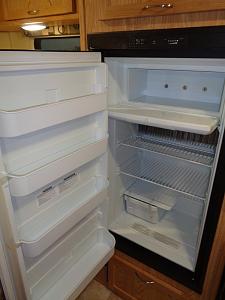
If your RV fridge is running but not getting cold in hot weather then you’ll be stuck with warm food and drinks, which is a no-go! Fortunately, there are a few things that can be done to troubleshoot the issue before calling a professional.
The first step is to check the temperature settings. If the temperature is set too high, the refrigerator will not cool properly. The ideal temperature for an RV refrigerator is between 34 and 40 degrees Fahrenheit. Adjust the temperature setting and wait for a few hours to see if the temperature drops.
Another common cause of an RV refrigerator not cooling in hot weather is a dirty condenser coil. The condenser coil is responsible for releasing heat from the refrigerator. Over time, dust and debris can accumulate on the coil, reducing its efficiency. To clean the condenser coil, turn off the refrigerator and unplug it. Use a soft brush or vacuum cleaner to remove the dust and debris from the coil.
If cleaning the condenser coil does not solve the problem, the next step is to check the door seals. If the door seals are damaged or worn, warm air can enter the refrigerator, preventing it from cooling properly. To check the door seals, close the door on a piece of paper. If the paper can be easily pulled out, the door seals need to be replaced.
Also be sure that you have proper ventilation and install an RV refrigerator fan if needed.
Finally, if none of the above steps work, it may be time to call a professional. The problem could be caused by a faulty thermostat, compressor, or other internal component. A professional can diagnose and repair the issue, ensuring the RV refrigerator is working properly in hot weather.
RV Fridge Won’t Power On
There are several reasons why your RV fridge won’t turn on, and it’s important to troubleshoot the issue to determine the cause and find a solution.
One common reason for an RV fridge not powering on is a lack of power. Check to make sure that the RV’s battery is fully charged and that the refrigerator is properly connected to a power source. If the battery is dead or the connection is loose, the fridge won’t be able to turn on.
Speaking of power sources, some RV fridges don’t have an automatic switch to change between propane or electric power, so you may need to switch it manually.
Another possible reason for a fridge not powering on is a blown fuse. Check the RV’s fuse box to see if any fuses related to the refrigerator have blown. If so, replace them with new fuses of the same amperage.
It’s also possible that the fridge’s control board is faulty. This component controls the fridge’s power and can fail due to age or damage. If the control board is the issue, it will need to be replaced.
Finally, if none of these solutions work, it’s possible that the fridge itself is faulty and needs to be repaired or replaced. It’s important to consult with a professional technician to determine the best course of action.
RV Freezer Works But Not The Refrigerator
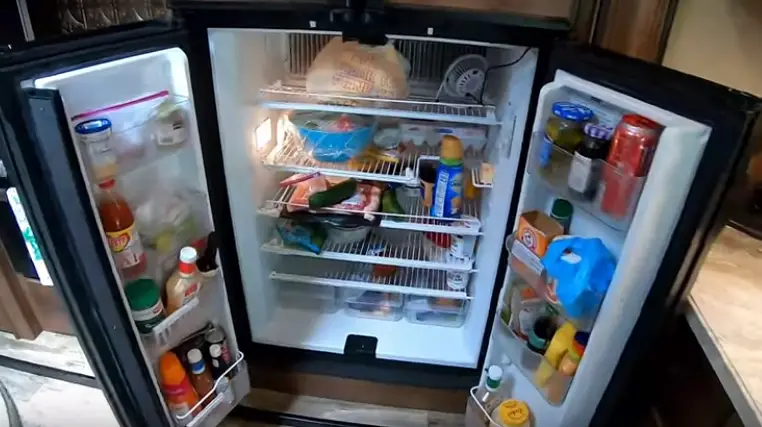
When the RV freezer is working but the refrigerator is not, it indicates that there is an issue with the airflow. The cool air from the freezer is supposed to circulate into the refrigerator through a diffuser. If there is a blockage in the diffuser, the cool air will not be able to reach the refrigerator, causing it to remain warm.
One common cause of a blocked diffuser is ice buildup. As the evaporator fan circulates the cool air from the freezer, it can cause moisture to freeze in the diffuser, creating a blockage. To fix this issue, turn off the refrigerator and allow it to defrost completely. Once the ice has melted, turn the refrigerator back on and check if the airflow has improved.
Another reason why the RV freezer may be working but not the refrigerator is due to a malfunctioning thermistor. The thermistor is responsible for monitoring the temperature in the refrigerator and freezer compartments. If it is not functioning correctly, it can cause the refrigerator to remain warm while the freezer remains cool. In this case, the thermistor will need to be replaced.
Temperature sensors can also be a culprit in this situation. If the temperature sensors are not working correctly, they may not be able to detect the temperature in the refrigerator compartment, causing it to remain warm. Check the sensors and replace them if necessary.
Lastly, blocked refrigerator exhaust can also cause the RV freezer to work but not the refrigerator. If the exhaust is blocked, the cool air will not be able to circulate properly, causing the refrigerator to remain warm. Clean the exhaust and ensure that there are no obstructions in the way.
Temperature and Insulation Concerns
When it comes to RV refrigerators, temperature and insulation are two key factors that can affect their performance. Here are some important things to keep in mind:
- Temperature: RV refrigerators are designed to operate within a certain temperature range. If the ambient temperature around the refrigerator is too high, it can cause the fridge to struggle to maintain a cool temperature. Conversely, if the temperature is too low, the refrigerator may not be able to produce enough heat to operate properly. It’s important to monitor the temperature around the fridge and make adjustments as necessary.
- Insulation: The insulation in an RV refrigerator is crucial for maintaining a consistent and cool temperature. If the insulation is damaged or worn out, it can cause the fridge to work harder and struggle to maintain the desired temperature. It’s important to inspect the insulation regularly and replace it if necessary.
In addition to these concerns, it’s also important to keep the fridge level and ensure that there is sufficient ventilation around it. By keeping these factors in mind, RV owners can help ensure that their refrigerator is operating as efficiently and effectively as possible.
See Related: How To Keep Your RV Fridge Closed While Traveling
Component Failures
When an RV refrigerator is not cooling, it could be due to a component failure. Here are some of the most common component failures that can cause an RV refrigerator to stop cooling:
Cooling Unit
The cooling unit is the heart of an RV refrigerator. It is responsible for removing heat from the interior of the refrigerator and dissipating it outside. If the cooling unit fails, the refrigerator will not cool properly. One of the most common causes of cooling unit failure is a blockage in the refrigerant lines. This can be caused by a leak or by a buildup of sediment or debris in the lines.
Thermostat
The thermostat is responsible for regulating the temperature inside the refrigerator. If the thermostat fails, it may not be able to accurately sense the temperature inside the refrigerator and may not turn on the cooling system when it is needed. This can result in the refrigerator not cooling properly.
Evaporator Fan
The evaporator fan is responsible for circulating air over the evaporator coils, which helps to remove heat from the interior of the refrigerator. If the fan fails, the refrigerator may not cool properly. The fan may fail due to a faulty motor, a broken blade, or a loose connection.
Control Board
The control board is responsible for controlling all of the functions of the refrigerator, including the cooling system, the thermostat, and the evaporator fan. If the control board fails, the refrigerator may not cool properly. Control board failure can be caused by a power surge, a faulty component, or a manufacturing defect.
Other Common Problems and Troubleshooting
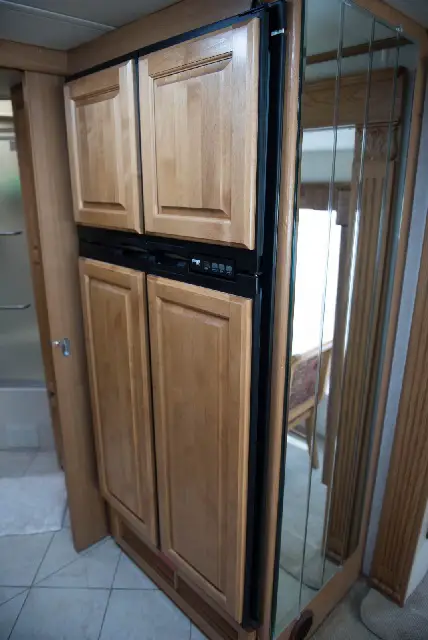
When your RV refrigerator is not cooling, there are several other common problems that you should check before calling a professional. Here are some troubleshooting tips to help you identify and fix the issue:
Make Sure Your RV Is Level
One common reason why your RV refrigerator may not be cooling properly is that your RV is not level. When your RV is not level, the cooling unit may not work properly, which can cause the refrigerator to stop cooling. To fix this issue, make sure that your RV is level before turning on the refrigerator.
Check The Breakers (On 120V Power)
If your RV refrigerator is not cooling on 120V power, then you should check the breakers. The breakers may have tripped, which can cause the refrigerator to stop cooling. If the breakers have tripped, then you should reset them and try turning on the refrigerator again.
Check The Fuses (On 12V Power)
If your RV refrigerator is not cooling on 12V power, then you should check the fuses. The fuses may have blown, which can cause the refrigerator to stop cooling. If the fuses have blown, then you should replace them and try turning on the refrigerator again.
Make Sure Your Shore Power Plug Is In Good Shape
If your RV refrigerator is not cooling on shore power, then you should check the shore power plug. The shore power plug may be frayed, loose, or damaged, which can cause the refrigerator to stop cooling. If the shore power plug is damaged or loose, then you should replace it and try turning on the refrigerator again.
Inactivity and Sediment Buildup
If your RV refrigerator has been inactive for a long time, then sediment buildup may have occurred. This can cause the refrigerator to stop cooling. To fix this issue, you should clean the refrigerator coils and vacuum the sediment buildup.
Double Check Your RV Refrigerator Wiring
If your RV refrigerator is not cooling properly, then you should double check the wiring. The wiring may be loose or damaged, which can cause the refrigerator to stop cooling. If the wiring is loose or damaged, then you should repair it and try turning on the refrigerator again.
RV Ammonia Issues
If you smell ammonia around your RV refrigerator, then you may have an ammonia leak. This can cause the refrigerator to stop cooling properly and can be dangerous. If you suspect an ammonia leak, then you should turn off the refrigerator and call a professional to repair it.
See Related: How To Check Your RV Fridge’s Ammonia Level
By following these troubleshooting tips, you can identify and fix common issues with your RV refrigerator not cooling. If these tips do not solve the problem, then you should call a professional to diagnose and repair the issue.

